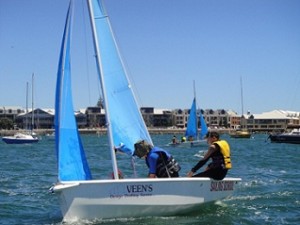 As an absolute beginner, you may well be a little nervous when it comes to getting out there. It all seemed like such a great idea, up until that moment you realised you’re actually required to step foot onto a boat and make it go where you want, without crashing it, sinking it or otherwise embarrassing yourself.
As an absolute beginner, you may well be a little nervous when it comes to getting out there. It all seemed like such a great idea, up until that moment you realised you’re actually required to step foot onto a boat and make it go where you want, without crashing it, sinking it or otherwise embarrassing yourself.
We’ve compiled a few beginner’s questions that are often common concerns amongst those starting out, and we’ll address them thoroughly. So don’t be embarrassed – your first few sailing excursions are meant to be learning experiences, so try and enjoy them, despite the inevitable false starts.
You do get used to it, and it does go away – but often not as quickly as you might prefer. If it’s a chronic problem for you, there are ways you can handle it.
The over-the-counter medicine Dramamine provides effective relief for many people. Pressure-point wrist-bands also get good results for some – despite their somewhat questionable roots in alternative medicine, they actually do press on a major nerve linked to the body’s sense of balance, which seems to have a helpful effect when you’re standing on a boat swaying from side to side.
The simple answer is: it depends. If you want to sail a simple dinghy in calm waters inshore, then you’ll be able to get up and running quickly. You might just need a few hours with a competent instructor in order to learn the basics.
If you want to jump in at the deep end (so to speak) – perhaps piloting motorboats on the open waves, captaining a crew or getting involved in racing – then a thorough course in the appropriate techniques will serve you well. We generally recommend that people take a foundational course such as the RYA Day Skipper, which gives you a broad base of basic skills – and then moving on to more specialised training.
Most courses are carried out over a weekend, and it’s amazing how much you learn in a short space of time.
As you’d expect, there are some very specific do’s and don’ts when it comes to piloting a boat.
Different sailing locations have different regulations, and canals, rivers and lakes all have their own rules. Offshore sailing is subject to national and international laws, and there are often guidelines specific to the area and conditions that you’ll be sailing in.
The best thing to do is do your research before hand – these days, a quick ten minutes on Google should yield the bare bones of the things you need to know to sail your boat safely in your chosen location.
Of course, the most thorough way to cover all the pertinent laws and regulations is to take a course related to the type of sailing you want to do. Courses such as the RYA Day Skipper or RYA Coastal Skipper will leave you with a complete understanding of how to pilot your boat and behave like a responsible, law-abiding sailor.
If you want to get started boating, there doesn’t need to be a huge barrier to entry. Start small, choose calm waters and a simple boat, and talk to someone who knows the ropes. Take a course if needed, but the main thing is to get yourself out on the water – you’ll learn quickly, and you’ll be thinking of yourself as a sailor in no time flat.
All of us at “Miramar Sailing” started our careers with the RYA and have progressed from total novice to RYA Certified Cruising Instructors and Yachtmaster Examiner over many years, so everything is possible. You can even make a new career in the sailing industry! We love to help newcomers to develop their skills, and passion for sailing, that we enjoy! Happy Sailing!